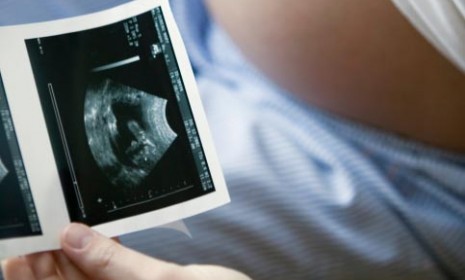Coming soon: Making babies... without sperm?
In a new book, Like a Virgin: How Science is Redesigning the Rules of Sex, a biologist outlines the concept of the "ultimate solo parent" of the future

A free daily email with the biggest news stories of the day – and the best features from TheWeek.com
You are now subscribed
Your newsletter sign-up was successful
Advances in technology, like in vitro fertilization and surrogacy, have opened up whole new ways for people to reproduce and start families. Now, Dr. Arathi Prasad, a writer with a PhD in mammalian cell cycle biology, says the parent of the future may not even require any assistance at all from a partner — spouse, surrogate, sperm donor, or otherwise. In her book, Like a Virgin: How Science is Redesigning the Rules of Sex, Prasad describes the "ultimate solo parents" of tomorrow, who are able to use their own stem cells to produce the eggs and sperm necessary for offspring — all on their own. Here's what you should know:
How would this work?
It all revolves around stem cells — the malleable, early-stage cells that can be coaxed into other living parts, including skin, vital organs, and sperm and egg cells. According to Prasad, women could theoretically eliminate the need for sex and sperm during the baby-making process. Instead, a woman "could use her own stem cells and an artificial Y chromosome to produce healthy new eggs and sperm at any age," says Kira Cochrane at iol, creating a "pseudo-sperm" that would fertilize an egg to create an embryo. A mother wouldn't even need to carry the fetus in her own body; instead, her child-to-be could gestate in an artificial womb.
The Week
Escape your echo chamber. Get the facts behind the news, plus analysis from multiple perspectives.

Sign up for The Week's Free Newsletters
From our morning news briefing to a weekly Good News Newsletter, get the best of The Week delivered directly to your inbox.
From our morning news briefing to a weekly Good News Newsletter, get the best of The Week delivered directly to your inbox.
Couldn't men do the same thing?
They could, at least in theory. Such a development would allow gay couples to have children created from their own DNA, or single men to become parents just as easily as women. This kind of breakthrough could be a "great biological and social equalizer," writes Prasad. Men and women could have equal clout in the parenting process from the very beginning. Traditional parenting roles would ultimately have to be reassessed.
Wouldn't that mean the offspring are clones of their parents?
Science fiction might make that sound like it'd be the case, but it's actually not. "Every time you create an egg there's a shuffling of the DNA," says Prasad. That means each child will be slightly different, and it's the same reason why siblings "don't tend to look the same."
A free daily email with the biggest news stories of the day – and the best features from TheWeek.com
What about natural processes like breast milk production?
Prasad believes that all the biological experiences an expectant mother goes through could be recreated with technology. "The body is a machine," she says. Hormone therapy could be used to induce milk production in the body — even for males. Another bonus: Smoking, drinking, and other self-destructive behavior would no longer be dangerous biological factors for producing children. "The whole idea of nature being fantastic — it's not," says Prasad. "There are situations where it's not healthy [in the womb], and babies would be better off outside."
What kind of breakthroughs point to this one day being possible?
Previous studies conducted on animals have found it possible to create healthy new eggs forged from bone marrow. The same goes for sperm. Prasad envisions these kinds of futuristic conception methods being possible within the next 40 or so years after all the ethical, technological, and regulatory hurdles are out of the way. It's not really a question of "if" when it comes to this kind of technology, notes Prasad — but "when."
-
 Minnesota's legal system buckles under Trump's ICE surge
Minnesota's legal system buckles under Trump's ICE surgeIN THE SPOTLIGHT Mass arrests and chaotic administration have pushed Twin Cities courts to the brink as lawyers and judges alike struggle to keep pace with ICE’s activity
-
 Big-time money squabbles: the conflict over California’s proposed billionaire tax
Big-time money squabbles: the conflict over California’s proposed billionaire taxTalking Points Californians worth more than $1.1 billion would pay a one-time 5% tax
-
 ‘The West needs people’
‘The West needs people’Instant Opinion Opinion, comment and editorials of the day